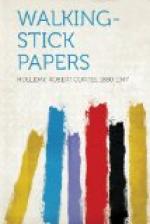The English “go on” a good deal about our slang. They used to be fond of quoting in superior derision in their papers our, to them, utterly unintelligible baseball news. Mr. Crosland, to drag him in again, to illustrate our abuse of “the language,” quotes from some tenth-rate American author—which is a way they have had in England of judging our literature—with the comment that “that is not the way John Milton wrote.” Not long ago Mr. Crosland became involved in a trial in the courts in connection with Oscar Wilde, Lord Alfred Douglas and Robert Ross. He defended himself with much spirit and considerable cleverness. Among other things he said, as reported in the press: “What is this game? This gang are trying to do me down. Here I am a poor man up against two hundred quid (or some such amount) of counsel.”
Well, that wasn’t the way John Milton talked, either.
The English slang for money is a pleasant thing: thick’uns and thin’uns; two quid, five bob; tanners and coppers. And they have a good body of expressive and colourful speech. “On the rocks” is a neat and poetic way of saying “down and out.” It is really not necessary to add the word “resources” to the expression “on his own.” A “tripper” is a well-defined character, and so is a “flapper,” a “nipper,” and a “bounder.” There had to be some word for the English “nut,” as no amount of the language of John Milton would describe him; and while the connotation of this word as humour is different with us, the appellation of the English, when you have come to see it in their light, hits off the personage very crisply. To say that such a one “talks like a ha’penny book” is, as the English say, “a jolly good job.” And a hotel certainly is presented as full when it is pronounced “full up.” A “topper” would be only one kind of a hat. Very well, then it is quite possible, we see, to be “all fed up,” as they say in England, with English slang.
Humorous Englishmen sometimes rather fancy our slang; and make naive attempts at the use of it. In England, for instance, a man “gets the sack” when he is “bounced” from his job. So I heard a lively Englishman attracted by the word say that so and so should “get the bounce.”
In writing, the Englishman usually employs “the language.” He has his yellow journals, indeed, which he calls “Americanised” newspapers. But crude and slovenly writing certainly is not a thing that sticks out on him. What a gentlemanly book reviewer he is always! We have here in the United States perhaps a half dozen gentlemen who review books. Is it not true that you would get tired counting up the young English novelists who are as accomplished writers as our few men of letters? The Englishman has a basketful of excellent periodicals to every one of ours. And in passing it is interesting to note this. When we are literary we become a little dull. See our high-brow journals! When we frolic we are a little, well, rough. The Englishman can be funny, even hilarious, and unconsciously, confoundedly well bred at the same time. But he does have a rotten lot of popular illustrated magazines over there compared to ours.




